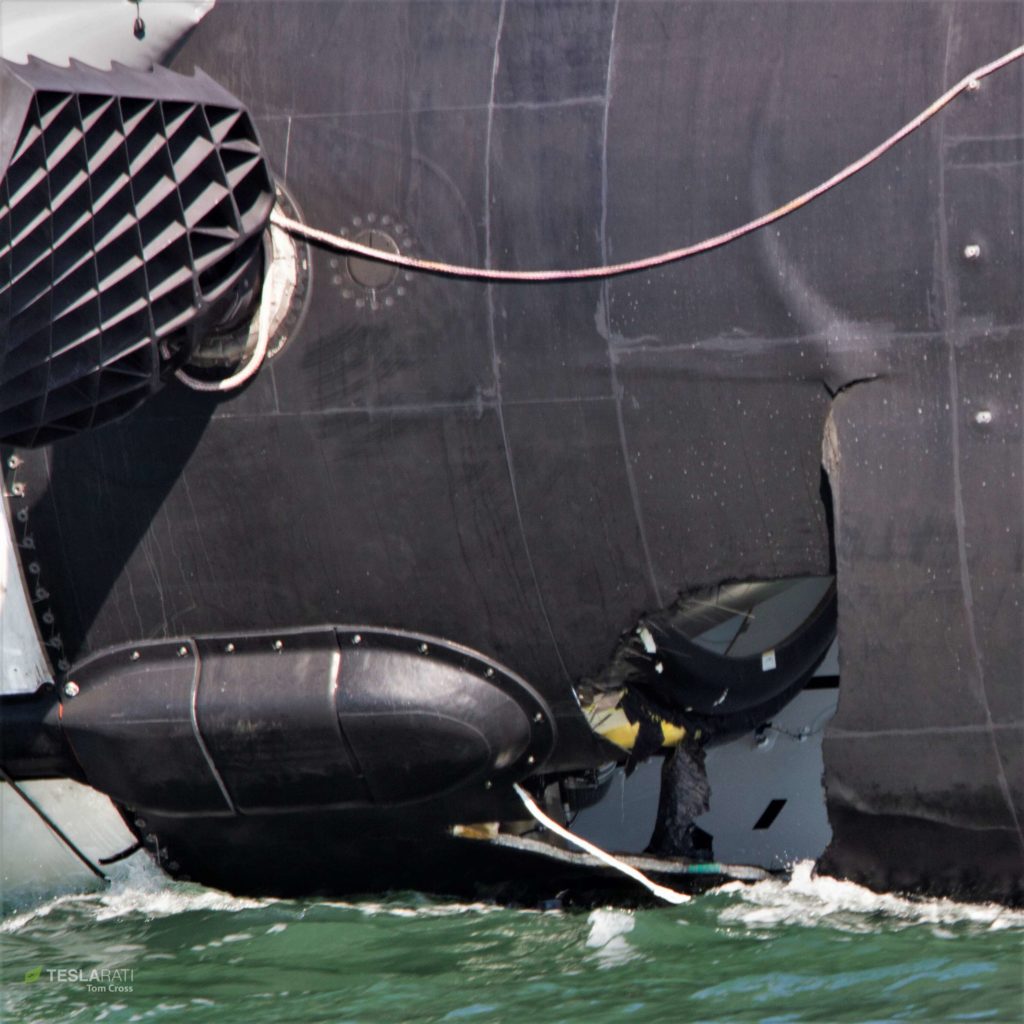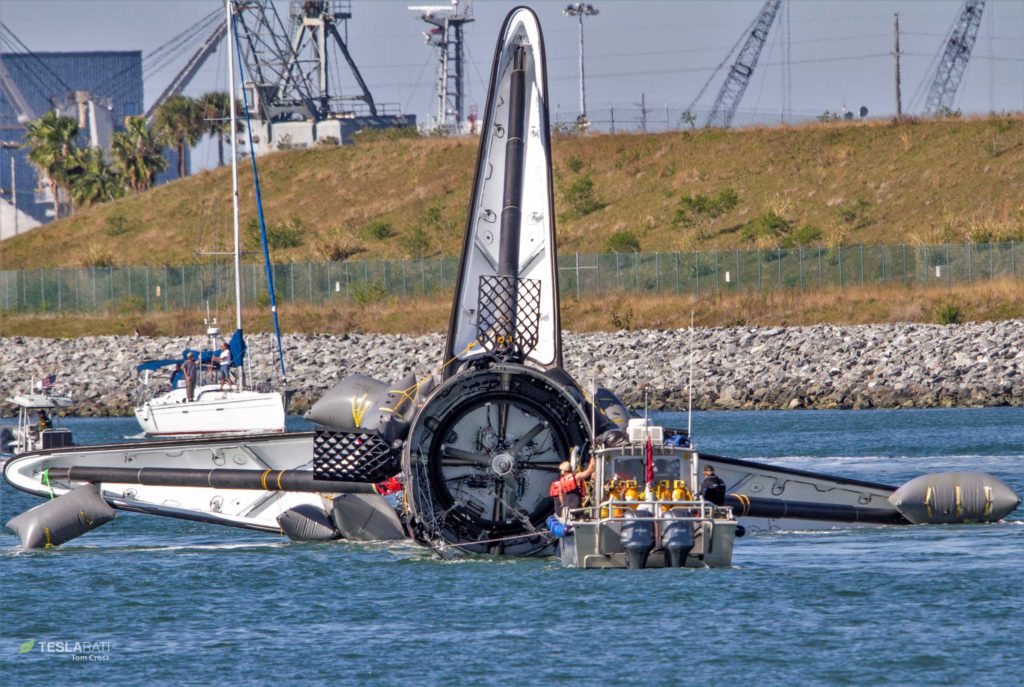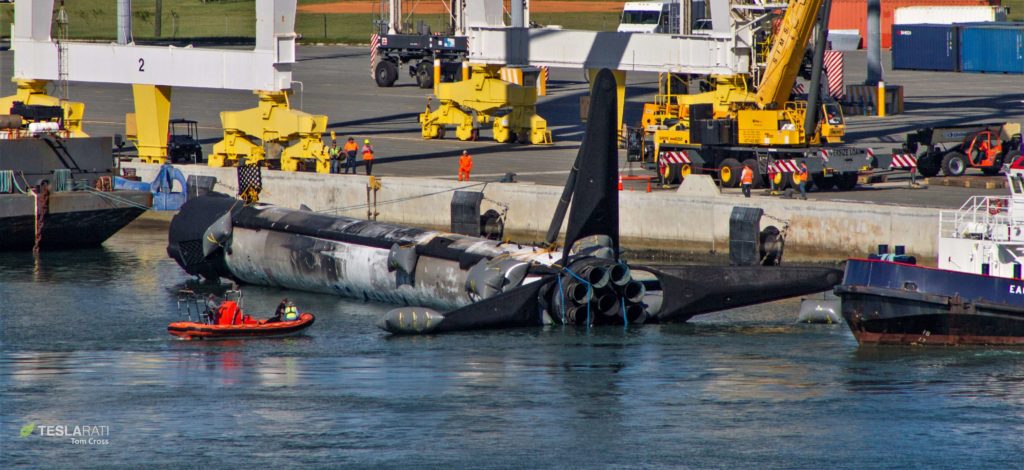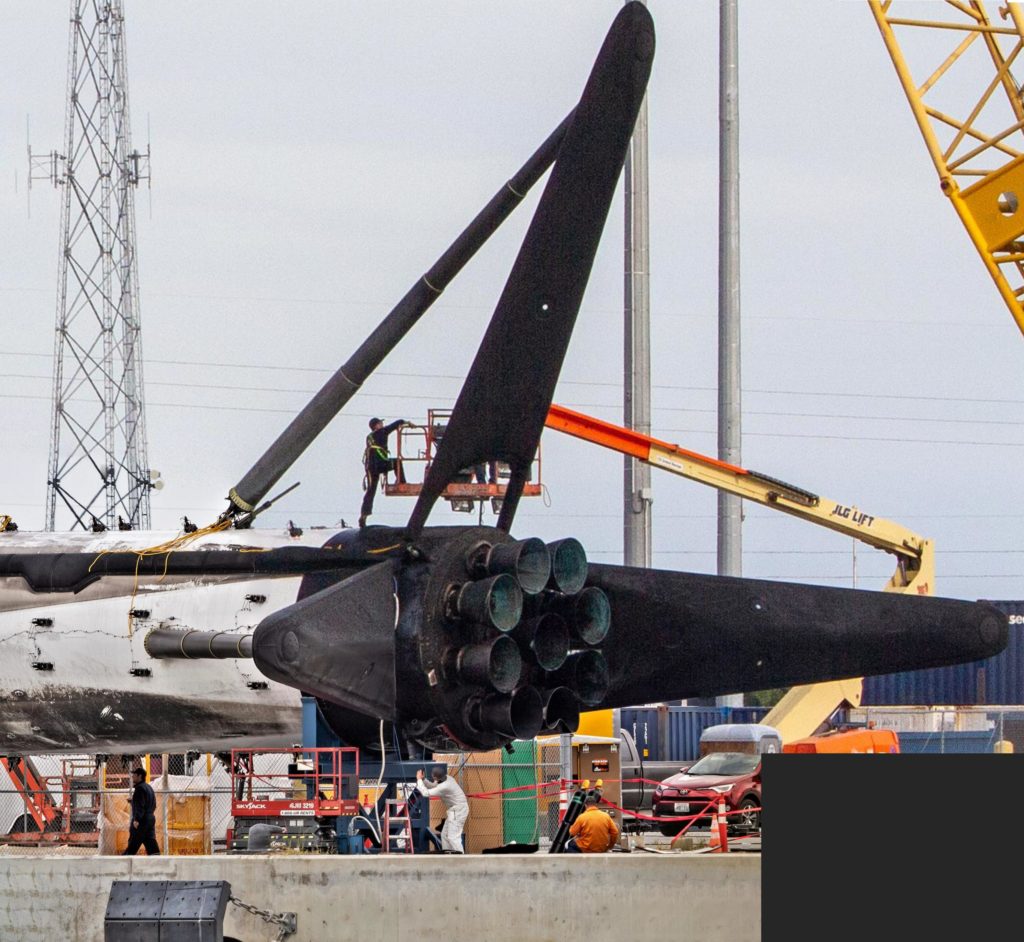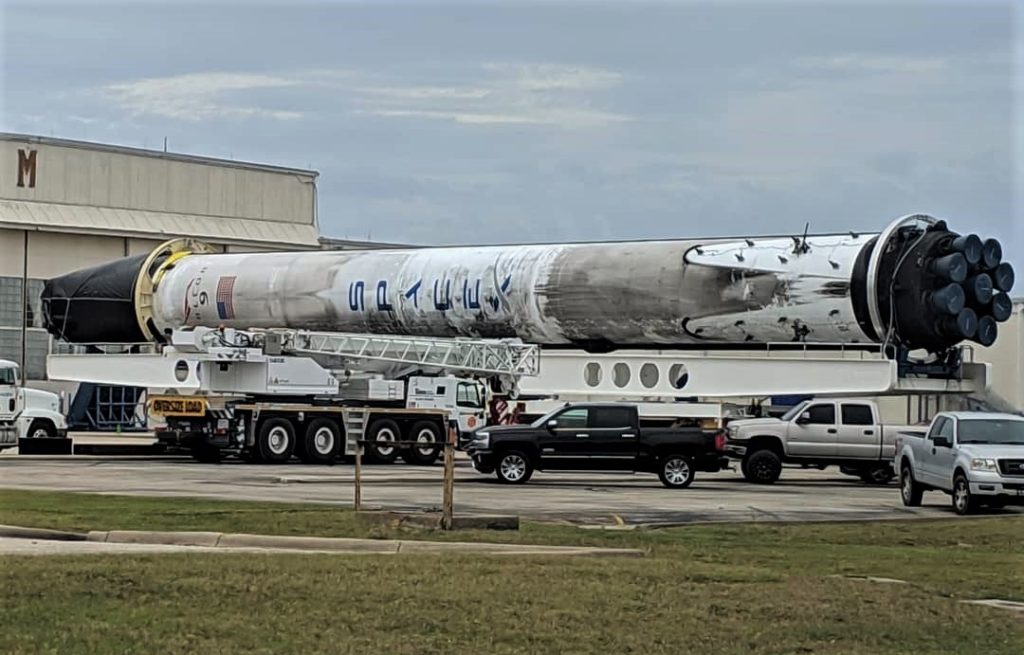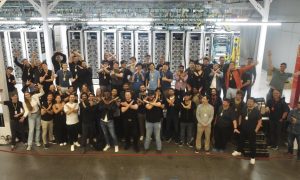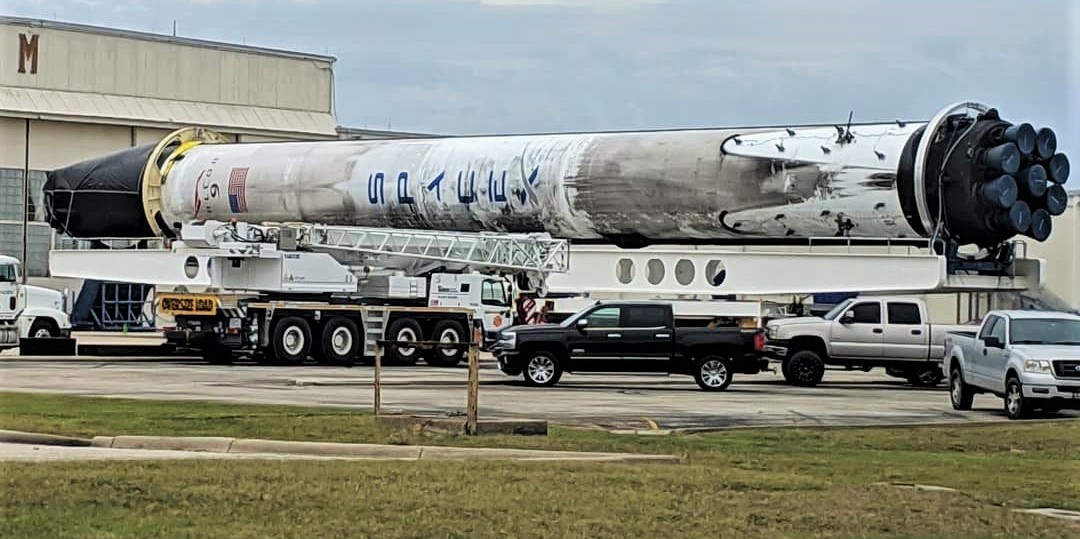

News
SpaceX lifts soggy Falcon 9 Block 5 booster ashore after accidental splashdown
Independent group USLaunchReport has published a video capturing the entirety of SpaceX’s ad hoc East Coast Falcon 9 recovery operations, in which forlorn booster B1050 had to be carefully extracted out of the ocean after an unintentional soft-landing in the Atlantic following its successful Dec. 5 launch debut.
72 hours after B1050’s water landing and some painstaking preparation, the booster was towed to SpaceX’s dock space in Port Canaveral, where it spent just a brief few hours floating adjacent to drone ship Of Course I Still Love You and the rest of the company’s Florida fleet. Considerably less than twelve hours after arriving, technicians had already managed to lift the rocket out of the ocean and onto dry land, where another week or so was spent preparing Falcon 9 for transport.
Given the extent of the damage to the Block 5 booster’s interstage and the basic fact that SpaceX recovery technicians and engineers had never attempted anything quite like it before, it was fairly impressive that they took barely six hours to lift the booster out of the water, particularly considering that the rocket appeared to be filled with hundreds or even thousands of gallons of water. No visible damage was caused, although there was clearly some cause for extensive discussion and preparation per an unusually large and lengthy huddle of more than 30 employees prior to the beginning of the lift.
https://twitter.com/_TomCross_/status/1071886823721447424
Once on land, B1050 had an unusual sling placed exactly where the Falcon 9 booster’s liquid oxygen (LOx) and kerosene (RP-1) propellant tanks were welded together, apparently a location that is particularly sensitive to off-nominal X-axis stress. To give context, imagine bending a cardboard tube or straw in half instead of trying to push its ends together – Falcon 9’s structure is quite similar in concept. Built primarily 5mm-thick sheets of lithium-aluminum alloy, Falcon 9’s propellant tanks are extremely thin and light while also being aggressively optimized for vertical (up and down) loading, i.e. the forces experienced while accelerating (and eventually decelerating) through the atmosphere during launch and landing.
As a result, SpaceX almost always pressurizes the first stage propellant tanks of Falcon 9 with nitrogen whenever boosters are horizontal without physical support at their bendy centers. In the case of B1050, SpaceX almost certainly concluded that using its waterlogged umbilical ports to inject nitrogen into its tanks was too much of a risk without knowing the precise condition of the piping and the tanks themselves, opting instead to go with a simple sling to prevent damage from unintended bending. Thankfully, B1050 appears to have made it through its dry land ordeal even better than the time it spent in the Atlantic, suffering no visible damage whatsoever.
- Sad interstage is sad. (Tom Cross)
- An almost impossibly rare view. (Tom Cross)
- That’s no boat… (Teslarati)
- SpaceX technicians had to go through the normal process of Falcon 9 booster recovery at a decidedly abnormal 90 degree delta. (Tom Cross)
- Falcon 9 B1050 was spotted at CCAFS near hangars SpaceX leases for refurbishment. (Instagram/anonymous)
Somewhere between December 14 and 15, the booster was at long last lifted onto SpaceX’s primary East Coast booster transporter and carefully drove the rocket to one of its 2-3 Cape Canaveral Air Force Station (CCAFS) refurbishment and storage hangars, avoiding detection by all but a few passersby. This could full well be the last we see (and even hear) of poor old Falcon 9 B1050, but there is still a decent chance that SpaceX hopes the entire rocket or major components can be easily salvaged.
Given the extreme care taken during the booster’s lift onto land and the week it spent having legs and grid fins removed, it can be definitively concluded that an effort will be made to save the entire vehicle (sans interstage). If it has managed to make it through the past two weeks largely unscathed, it may well become the first Falcon 9 to conduct a dedicated launch of multiple Starlink satellites sometime in the second half of 2019, at least according to CEO Elon Musk’s vague suggestion that it could fly on an “internal SpaceX mission”.
We may use it for an internal SpaceX mission
— Elon Musk (@elonmusk) December 5, 2018
For prompt updates, on-the-ground perspectives, and unique glimpses of SpaceX’s rocket recovery fleet check out our brand new LaunchPad and LandingZone newsletters!
News
Tesla launches in India with Model Y, showing pricing will be biggest challenge
Tesla finally got its Model Y launched in India, but it will surely come at a price for consumers.

Tesla has officially launched in India following years of delays, as it brought its Model Y to the market for the first time on Tuesday.
However, the launch showed that pricing is going to be its biggest challenge. The all-electric Model Y is priced significantly higher than in other major markets in which Tesla operates.
On Tuesday, Tesla’s Model Y went up for sale for 59,89,000 rupees for the Rear-Wheel Drive configuration, while the Long Range Rear-Wheel Drive was priced at 67,89,000.
This equates to $69,686 for the RWD and $78,994 for the Long Range RWD, a substantial markup compared to what these cars sell for in the United States.
🚨 Here’s the difference in price for the Tesla Model Y in the U.S. compared to India.
🚨 59,89,000 is $69,686
🚨 67,89,000 is $78,994 pic.twitter.com/7EUzyWLcED— TESLARATI (@Teslarati) July 15, 2025
Deliveries are currently scheduled for the third quarter, and it will be interesting to see how many units they can sell in the market at this price point.
The price includes tariffs and additional fees that are applied by the Indian government, which has aimed to work with foreign automakers to come to terms on lower duties that increase vehicle cost.
Tesla Model Y seen testing under wraps in India ahead of launch
There is a chance that these duties will be removed, which would create a more stable and affordable pricing model for Tesla in the future. President Trump and Indian Prime Minister Narendra Modi continue to iron out those details.
Maharashtra Chief Minister Devendra Fadnavis said to reporters outside the company’s new outlet in the region (via Reuters):
“In the future, we wish to see R&D and manufacturing done in India, and I am sure at an appropriate stage, Tesla will think about it.”
It appears to be eerily similar to the same “game of chicken” Tesla played with Indian government officials for the past few years. Tesla has always wanted to enter India, but was unable to do so due to these import duties.
India wanted Tesla to commit to building a Gigafactory in the country, but Tesla wanted to test demand first.
It seems this could be that demand test, and the duties are going to have a significant impact on what demand will actually be.
Elon Musk
Tesla ups Robotaxi fare price to another comical figure with service area expansion
Tesla upped its fare price for a Robotaxi ride from $4.20 to, you guessed it, $6.90.

Tesla has upped its fare price for the Robotaxi platform in Austin for the first time since its launch on June 22. The increase came on the same day that Tesla expanded its Service Area for the Robotaxi ride-hailing service, offering rides to a broader portion of the city.
The price is up from $4.20, a figure that many Tesla fans will find amusing, considering CEO Elon Musk has used that number, as well as ’69,’ as a light-hearted attempt at comedy over the past several years.
Musk confirmed yesterday that Tesla would up the price per ride from that $4.20 point to $6.90. Are we really surprised that is what the company decided on, as the expansion of the Service Area also took effect on Monday?
But the price is now a princely $6.90, as foretold in the prophecy 😂
— Elon Musk (@elonmusk) July 14, 2025
The Service Area expansion was also somewhat of a joke too, especially considering the shape of the new region where the driverless service can travel.
I wrote yesterday about how it might be funny, but in reality, it is more of a message to competitors that Tesla can expand in Austin wherever it wants at any time.
Tesla’s Robotaxi expansion wasn’t a joke, it was a warning to competitors
It was only a matter of time before the Robotaxi platform would subject riders to a higher, flat fee for a ride. This is primarily due to two reasons: the size of the access program is increasing, and, more importantly, the service area is expanding in size.
Tesla has already surpassed Waymo in Austin in terms of its service area, which is roughly five square miles larger. Waymo launched driverless rides to the public back in March, while Tesla’s just became available to a small group in June. Tesla has already expanded it, allowing new members to hail a ride from a driverless Model Y nearly every day.
The Robotaxi app is also becoming more robust as Tesla is adding new features with updates. It has already been updated on two occasions, with the most recent improvements being rolled out yesterday.
Tesla updates Robotaxi app with several big changes, including wider service area
News
Tesla Model Y and Model 3 dominate U.S. EV sales despite headwinds
Tesla’s two mainstream vehicles accounted for more than 40% of all EVs sold in the United States in Q2 2025.

Tesla’s Model Y and Model 3 remained the top-selling electric vehicles in the U.S. during Q2 2025, even as the broader EV market dipped 6.3% year-over-year.
The Model Y logged 86,120 units sold, followed by the Model 3 at 48,803. This means that Tesla’s two mainstream vehicles accounted for 43% of all EVs sold in the United States during the second quarter, as per data from Cox Automotive.
Tesla leads amid tax credit uncertainty and a tough first half
Tesla’s performance in Q2 is notable given a series of hurdles earlier in the year. The company temporarily paused Model Y deliveries in Q1 as it transitioned to the production of the new Model Y, and its retail presence was hit by protests and vandalism tied to political backlash against CEO Elon Musk. The fallout carried into Q2, yet Tesla’s two mass-market vehicles still outsold the next eight EVs combined.
Q2 marked just the third-ever YoY decline in quarterly EV sales, totaling 310,839 units. Electric vehicle sales, however, were still up 4.9% from Q1 and reached a record 607,089 units in the first half of 2025. Analysts also expect a surge in Q3 as buyers rush to qualify for federal EV tax credits before they expire on October 1, Cox Automotive noted in a post.
Legacy rivals gain ground, but Tesla holds its commanding lead
General Motors more than doubled its EV volume in the first half of 2025, selling over 78,000 units and boosting its EV market share to 12.9%. Chevrolet became the second-best-selling EV brand, pushing GM past Ford and Hyundai. Tesla, however, still retained a commanding 44.7% electric vehicle market share despite a 12% drop in in Q2 revenue, following a decline of almost 9% in Q1.
Incentives reached record highs in Q2, averaging 14.8% of transaction prices, roughly $8,500 per vehicle. As government support winds down, the used EV market is also gaining momentum, with over 100,000 used EVs sold in Q2.
Q2 2025 Kelley Blue Book EV Sales Report by Simon Alvarez on Scribd
-

 News3 days ago
News3 days agoTesla debuts hands-free Grok AI with update 2025.26: What you need to know
-

 Elon Musk1 week ago
Elon Musk1 week agoElon Musk confirms Grok 4 launch on July 9 with livestream event
-

 Elon Musk6 days ago
Elon Musk6 days agoxAI launches Grok 4 with new $300/month SuperGrok Heavy subscription
-

 News2 weeks ago
News2 weeks agoTesla Model 3 ranks as the safest new car in Europe for 2025, per Euro NCAP tests
-

 Elon Musk2 weeks ago
Elon Musk2 weeks agoxAI’s Memphis data center receives air permit despite community criticism
-

 News5 days ago
News5 days agoTesla begins Robotaxi certification push in Arizona: report
-

 Elon Musk2 weeks ago
Elon Musk2 weeks agoTesla reveals it is using AI to make factories more sustainable: here’s how
-

 Elon Musk2 weeks ago
Elon Musk2 weeks agoTesla scrambles after Musk sidekick exit, CEO takes over sales

